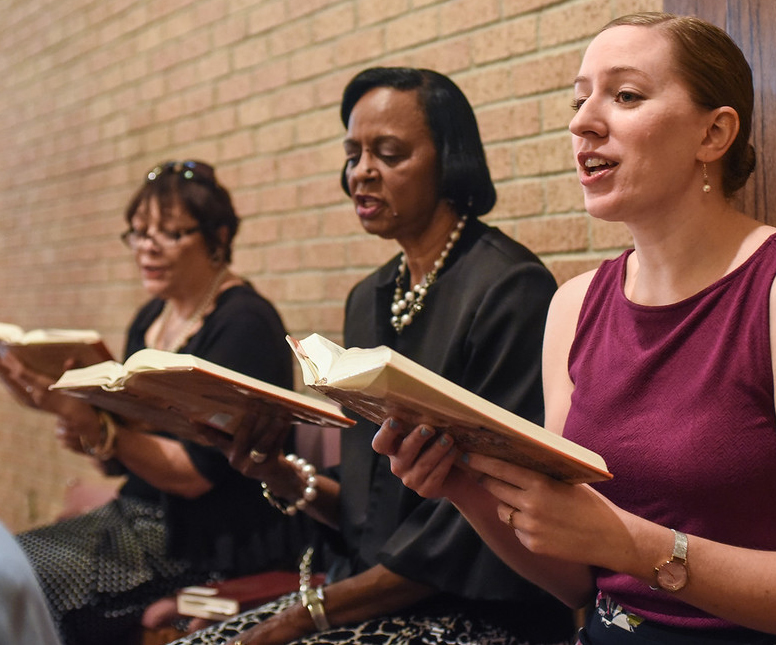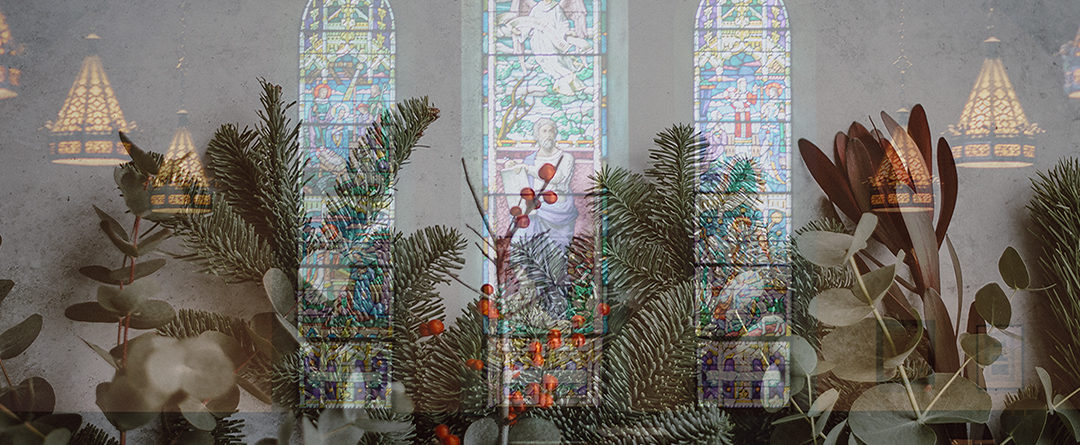by Becca Ehrlich
When I was growing up, my family and I had the annual tradition of trimming the Christmas tree together. We would put Christmas music on, drink hot chocolate, and systematically take the ornaments out of storage and place them on the tree. Some of the ornaments could be hung by anyone who got to them first. But some of them had to be put on the tree by a specific person—the ballerina ornaments were mine to hang, as was the “Baby’s First Christmas” ornament given to me when I was small.
This tradition of trimming the tree together officially started the holiday season in the Ehrlich family. The season wouldn’t have felt the same if we had skipped it—in fact, it probably wouldn’t have felt like the holiday season at all. This tradition set the tone and focused us on each other and the season.
 I’m reminded of the importance of tradition whenever I attend worship. Some worship traditions are specific to certain faith communities—how Holy Communion is served, for example, varies from congregation to congregation. But some traditions are universal to Christians. We all gather to pray, hear the Bible read and talk about our faith. How we do that in our particular communities can look different, but the tradition of coming together to worship Christ in our midst remains the same.
I’m reminded of the importance of tradition whenever I attend worship. Some worship traditions are specific to certain faith communities—how Holy Communion is served, for example, varies from congregation to congregation. But some traditions are universal to Christians. We all gather to pray, hear the Bible read and talk about our faith. How we do that in our particular communities can look different, but the tradition of coming together to worship Christ in our midst remains the same.
Even in the earliest Christian communities, tradition was valued.
The followers of Jesus in Thessalonica were told: “So then, brothers and sisters, stand firm and hold fast to the traditions that you were taught by us, either by word of mouth or by our letter” (2 Thessalonians 2:15). Traditions help communities form their own unique identity. Traditions help establish ways of observing times and seasons, like my family’s tradition of trimming the tree. Traditions also connect us to those who came before us – it can be humbling to participate in a tradition that has been done by people in many generations before you.
One of my favorite movies is Fiddler on the Roof. The very first scene includes the song “Tradition,” in which Tevye and his neighbors explain the traditions and roles of those who live in their town.
Gender roles aside, I have always loved this song. The villagers’ traditions shape how they live life every day, giving the community stability. In the story, some of the villagers’ traditions end up changing, because the world around them is changing. Tradition is both stable and flexible—our traditions connect us to our past and present community, while being able to change based on our current context.
Jesus was very clear that traditions don’t need to stay the same forever. We read in the Gospels about Jesus breaking the traditions of his day by healing people on the sabbath, talking to women, eating with sinners, overturning money tables in the temple, touching lepers, and teaching hearers to love both their friends and their enemies.
Jesus changed these traditions because they no longer fit what God was doing. God was doing something new and exciting. These traditions were keeping some people from experiencing God’s love and presence, and they needed to change. So Jesus changed them.
What can we learn from Jesus changing traditions? As long as a tradition still makes sense with what God is doing currently and adds value to a community, it can usually continue. But if the tradition either doesn’t make sense anymore or harms other people, it should change or end.
And when old traditions need to change or end, it gives us an opportunity to start new traditions—traditions that share God’s love with everyone and add value to our communities. The Holy Spirit is constantly moving and blowing new life into our communities, and keeping traditions just for the sake of tradition is not something Jesus was into. Our God is in the business of change and surprise—and that includes sometimes shaking up our deeply-held traditions and shaping them into something new.
There’s a great story in the Book of Acts about God starting a new tradition. In chapter 10, Peter visits Cornelius, a Roman military officer. God sent Peter there by giving him a vision. Now Peter meets not only Cornelius, but also a bunch of Cornelius’ friends. Peter eats with them and tells them about Jesus. And they become believers, receive the Holy Spirit, and are baptized! Pretty awesome stuff, wouldn’t you say?
But the early church leaders did not find this awesome. Peter and the church leaders were Jews, like all the the other believers and Jesus himself. And Cornelius and his friends were Gentiles, non-Jews. Jewish law and tradition said that Jewish people were not to associate with Gentiles. And not only did Peter interact with Gentiles, he invited them into the Jesus-follower fold. The leaders were pretty upset.
But Peter explains his vision to the leaders. He tells them that God told him not to put up walls between Gentiles and Jews. And he says, “The Spirit told me to go with them and not make a distinction between them and us” (Acts 11:12). Peter recognized that the walls between the two groups had to come down, because of what God was doing. The tradition needed to change.
And Peter explains that the Gentiles he spoke to received the Holy Spirit and believed, just as the Jewish believers had. He tells the leaders, “If God gave them the same gift he gave us when we believed in the Lord Jesus Christ, who was I that I could hinder God?” (Acts 11:17)
And at first, the leaders are stunned to silence. But then, they praise God! Like Peter, they recognized God was doing a new and amazing thing—God was giving the gift of faith in Jesus to all humanity! It was time for a new tradition.
Our traditions shape our communities and how we relate to each other. We are invited to take up God’s new activity in our lives and participate in traditions that help ourselves and others experience God’s love in an inclusive way.
Discussion questions:
1. What are some of your favorite traditions? Why do you enjoy them so much?
2. How do your favorite traditions help you and others in your community connect with each other and with God?
3. Can you think of a tradition you’ve experienced that could be changed or ended because God is doing something new? If it needs to be changed, what changes could be made? If it needs to end, would a different tradition make sense in its place?
Closing prayer:
Loving God, you have made us to love and serve you and others. Thank you for your Holy Spirit’s movement in our lives. Thank you for the ability to establish traditions in our communities. Help us to look at our traditions in light of what you are doing in our world today, so that we may continue to do your work in the world. In Jesus’ name, Amen.
 Becca Ehrlich is a Lutheran pastor serving as Associate Director of Admissions at United Lutheran Seminary in Gettysburg and Philadelphia, Pa. She blogs about minimalism from a Christian perspective at www.christianminimalism.com.
Becca Ehrlich is a Lutheran pastor serving as Associate Director of Admissions at United Lutheran Seminary in Gettysburg and Philadelphia, Pa. She blogs about minimalism from a Christian perspective at www.christianminimalism.com.
Photos by Unsplash.com and Jim Veneman.

